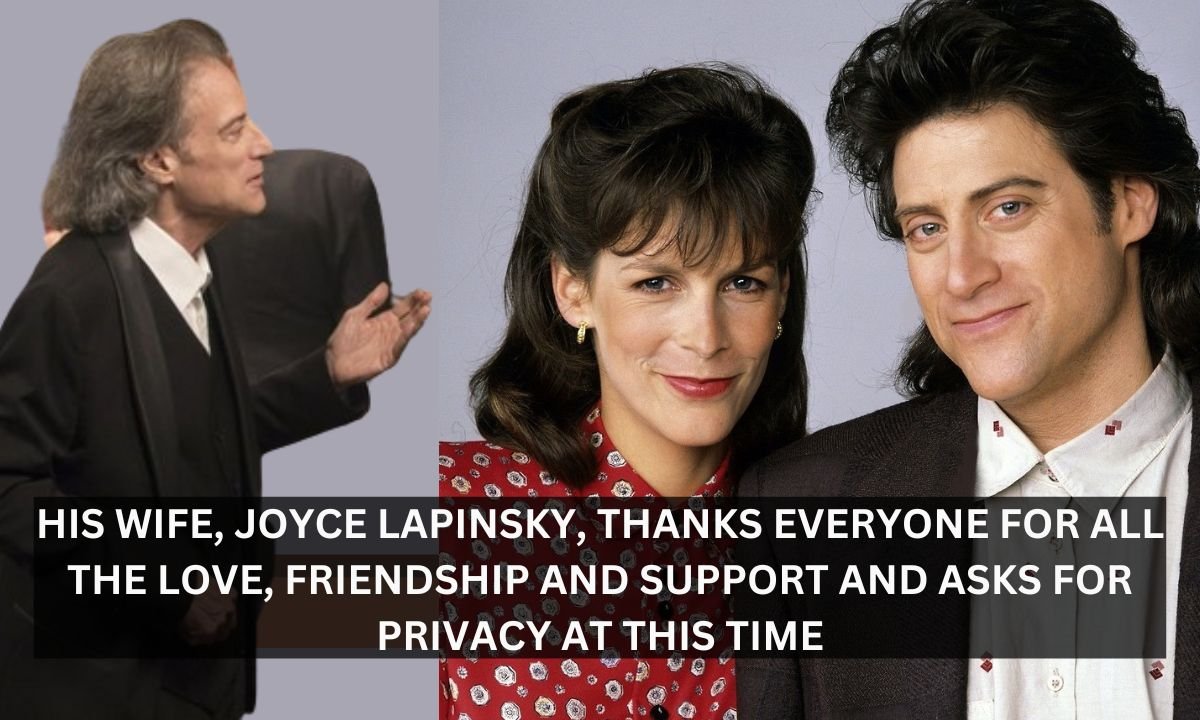Comedian Richard Lewis, who recently starred in ‘Curb Your Enthusiasm,’ dies at 76
Introduction
Richard Lewis: A Life in Comedy and Self-Discovery
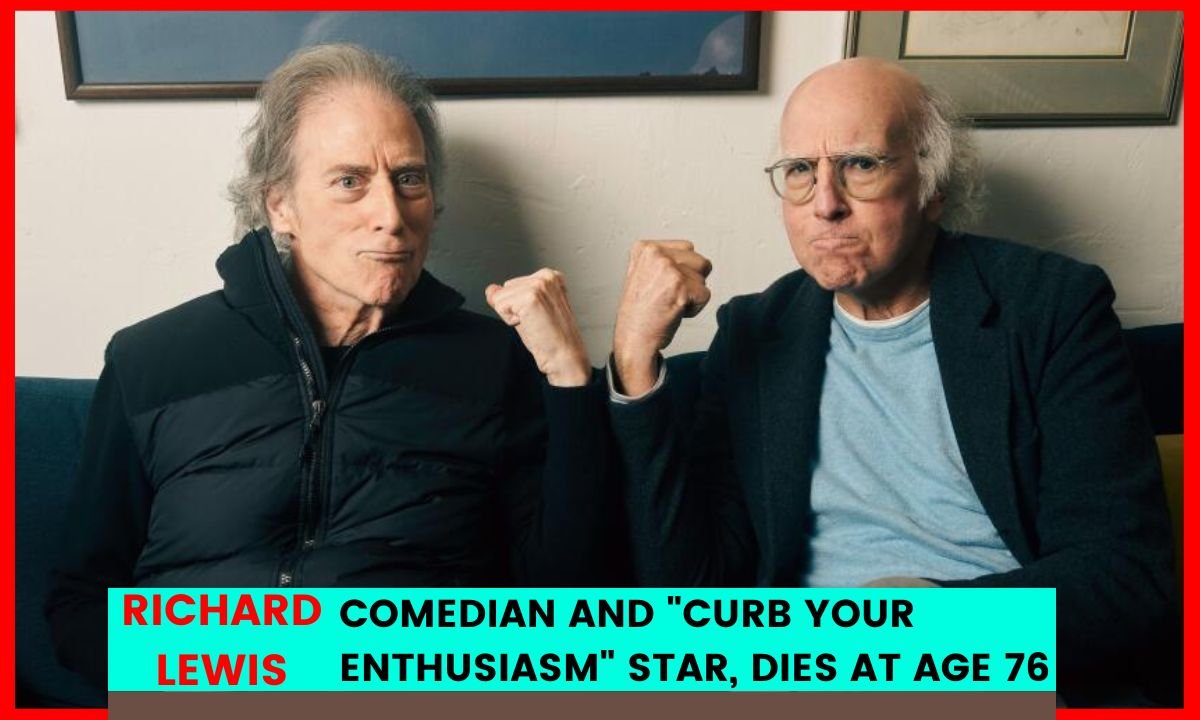
Richard Lewis, the iconic comedian affectionately known as “The Prince of Pain,” left the world a chuckle shorter with his passing in February 2024. Renowned for his self-deprecating humor and neurotic characters, his career spanned decades, encompassing stand-up comedy, television roles, and most notably, his hilarious turn on “Curb Your Enthusiasm.” This article delves deeper into Lewis’ life, exploring his journey, examining his comedic legacy, and celebrating his lasting impact on the world of entertainment.
A Young Life Shaped by Humor: Richard Lewis’ Early Journey
Born in 1947 in Newark, New Jersey, Richard Lewis’ formative years were a complex blend of family influences, personal challenges, and a budding love for humor.
Raised alongside two older siblings, Lewis’ childhood was marked by the contrasting figures of his parents. His father, Bill, held a demanding job as a catering co-owner, often leaving little time for family.
Blanche Lewis, his mother, an actress in community theatre, possessed a vibrant personality but grappled with her emotional battles.
Despite these challenges, Lewis found solace in laughter. Early exposure to iconic comedians like Lenny Bruce and Woody Allen sparked an interest in humor, providing an escape from the complexities of his personal life.
He devoured classic films like the Marx Brothers comedies and “Casablanca,” absorbing the nuances of witty characters and relatable situations. These early influences became the building blocks of his unique comedic style.
A significant tragedy struck Lewis’ youth at the age of 14 when his father passed away. This loss, combined with his mother’s ongoing struggles, left a lasting impact on the young boy. He later credited these experiences as shaping his humor, noting a tendency to internalize anxieties and channel them into comedic observations.
Though burdened by personal struggles, Lewis continued his education, attending Dwight Morrow High School and later graduating from Ohio State University in 1969.
While specific anecdotes about his educational years remain scarce, there’s evidence suggesting that humor served as a coping mechanism for Lewis.
As one classmate from high school recalled, “he was always the class clown, cracking jokes and trying to make people laugh.” These early attempts at humor, even if unintentional, hinted at Lewis’ natural comedic talent and his potential to pursue a career in stand-up comedy.
Taking the Stage: Lewis’ Early Stand-Up Journey
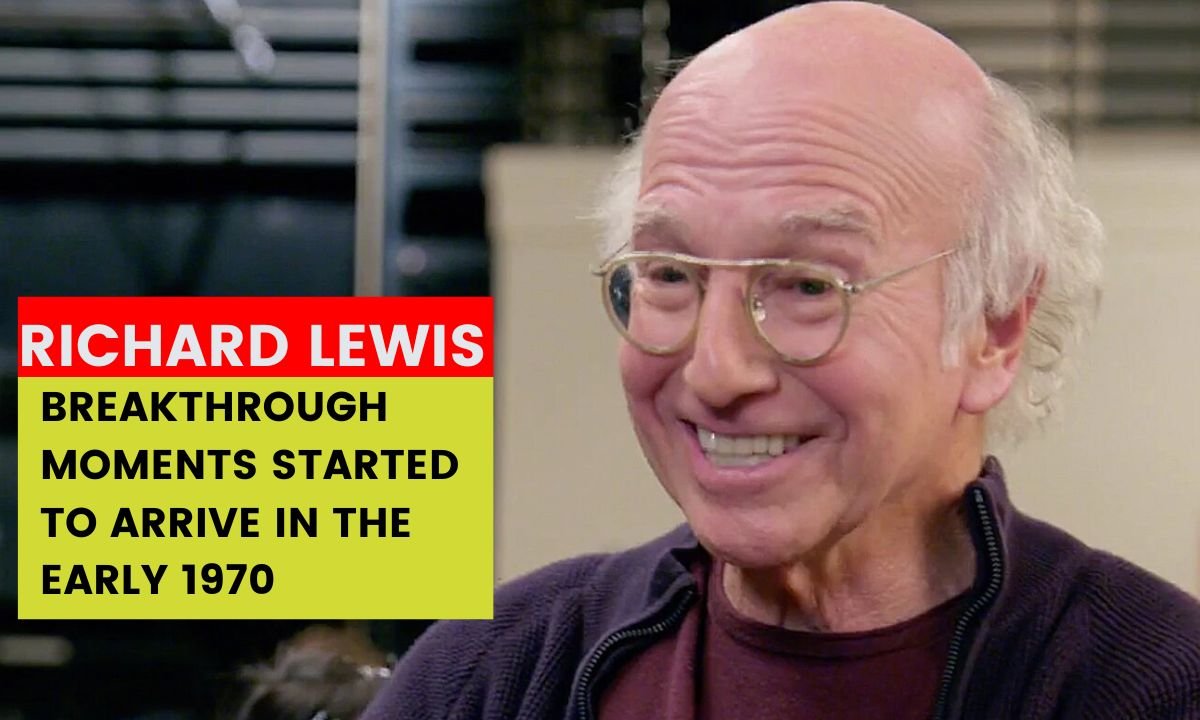
The late 1960s saw Richard Lewis, armed with a repertoire of jokes shaped by his life experiences, venture into the vibrant New York City stand-up scene. The initial years were a baptism by fire. Tiny, smoky clubs like The Improv and The Comic Strip became his training ground, where he faced the often-unforgiving gaze of New York audiences. These early gigs were riddled with challenges – hecklers, low pay, and the constant pressure to deliver fresh material. However, Lewis persevered, honing his craft through relentless practice and absorbing the wisdom of seasoned comedians like David Brenner, who provided valuable guidance and mentorship.
Lewis’ comedic style began to take shape during this period. His self-deprecating humor, characterized by self-effacing anecdotes and witty observations about his anxieties and neuroses, became his signature trademark. He masterfully transformed his insecurities into relatable material, allowing audiences to connect with his vulnerability while finding humor in his everyday struggles.
Breakthrough moments started to arrive in the early 1970s. A stand-up appearance on “The Tonight Show Starring Johnny Carson” in 1974 marked a significant turning point. Despite the pressure of performing on national television, Lewis delivered a memorable set, showcasing his unique brand of humor. His frenetic energy, rapid-fire delivery, and willingness to expose his vulnerabilities resonated with viewers, propelling him further into the spotlight.
Lewis’s early-stage presence was often described as electric. His trademark pacing, animated gestures, and expressive facial expressions added a physical dimension to his humor. Comedian Freddie Prinze, a contemporary of Lewis on the stand-up circuit, described his act as “pure energy,” while an article in the New York Times praised his ability to “turn his anxieties into comedic gold.”
Despite his growing success, Lewis still battled with insecurity and stage fright. He openly spoke about his struggles with self-doubt, which he later attributed to his early childhood experiences. However, he never let these challenges deter him from pursuing his passion. As his career progressed, he managed to channel his anxieties into his performance, making them not a hindrance but a source of his comedic power.
From Stand-Up Stages to Sitcom Screens: Lewis Finds TV Success
By the late 1970s, Richard Lewis had established himself as a rising star in the stand-up world. He was ready to take the next step and enter the realm of television. His big break came in 1989 with the sitcom “Anything But Love.” Playing opposite Jamie Lee Curtis, Lewis portrayed Warren Stone, a neurotic writer struggling in his personal and professional life. The show, infused with Lewis’ signature humor, resonated with audiences and ran for four successful seasons.
“Anything But Love” proved to be a pivotal moment in Lewis’ career. It not only allowed him to showcase his comedic talent on a wider platform but also introduced him to a new generation of fans. The show’s success paved the way for further television opportunities, demonstrating his versatility beyond stand-up routines. He appeared in guest roles on shows like “Seinfeld” and “Friends,” further solidifying his place in the television landscape.
Lewis also ventured into the world of film, showcasing his comedic range beyond the self-deprecating persona he honed in stand-up. In Mel Brooks’ 1993 film “Robin Hood: Men in Tights,” he embraced a comedically villainous role as Prince John, offering a hilarious counterpoint to the film’s other comedic heavyweights. This film demonstrated Lewis’ ability to adapt his comedic style to fit different characters and storylines.
However, it was his role in HBO’s “Curb Your Enthusiasm” that truly redefined his career in the later stages of his life. Playing a fictionalized version of himself as Larry David’s long-suffering best friend, Lewis became an integral part of the show’s success. Their on-screen dynamic, characterized by constant bickering and hilarious misunderstandings, resonated with audiences. Lewis’ iconic catchphrases, like “You didn’t!” and “Oh, good for you!” became part of pop culture, further solidifying his comedic legacy.
Larry David, the show’s creator and star, once stated, “Richard Lewis is one of the most gifted comedic actors I have ever worked with. He brings a unique energy and honesty to the role that elevates the show to another level.” Lewis himself, reflecting on his experience on the show, said, “Working with Larry has been a true pleasure and challenge. He pushes me to be a better actor and comedian, and I’m incredibly grateful for the opportunity.”
“Curb Your Enthusiasm” not only allowed Lewis to showcase his comedic timing and improv skills but also brought him back into the spotlight for a younger generation. The show’s success demonstrated his ability to adapt to changing comedic tastes and remain relevant throughout his career.
Navigating the Shadows: Richard Lewis’s Battle and Triumph over Addiction
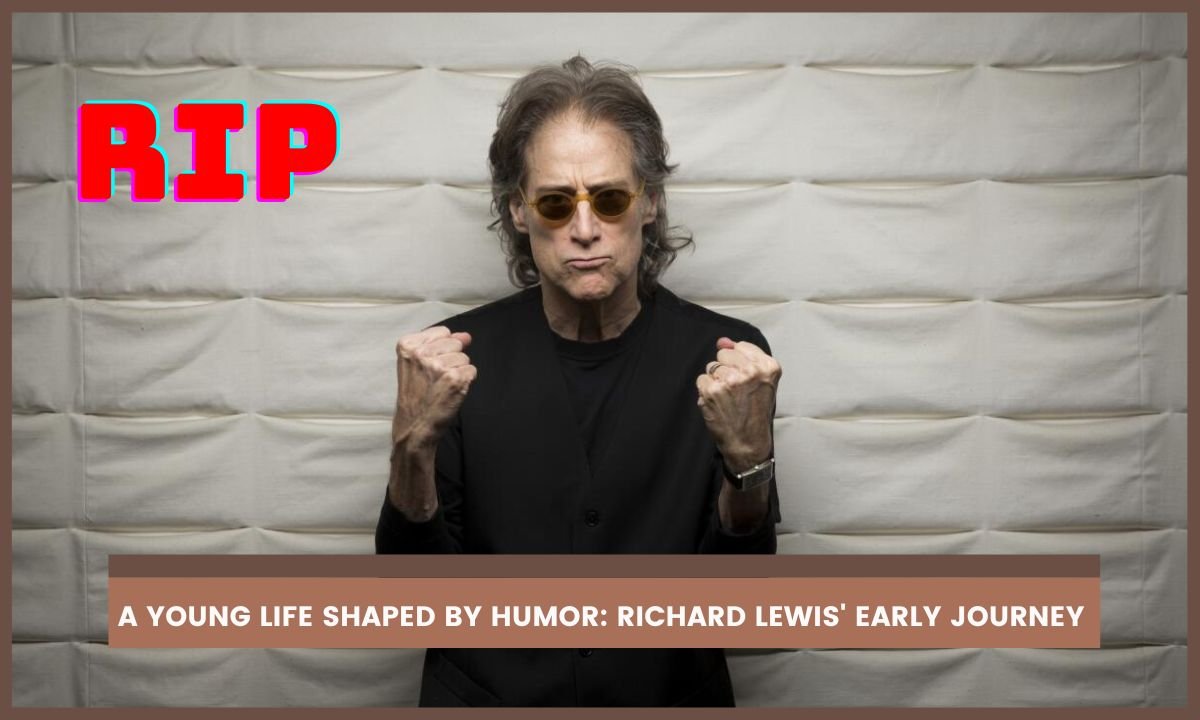
Richard Lewis’ journey was not solely defined by laughter and comedic brilliance. Throughout his life, he bravely faced a personal battle with drug and alcohol addiction, a struggle that deeply impacted him both personally and professionally.
The challenges started in the early 1970s, as Lewis grappled with the pressures of a burgeoning career and the emotional complexities rooted in his childhood experiences. He turned to substances, initially viewed as a coping mechanism, which gradually morphed into a dependency. The addiction began to affect his professional life, leading to missed gigs and inconsistent performances.
In 1994, Lewis reached a turning point. A cocaine overdose served as a wake-up call, forcing him to confront the severity of his addiction. This incident marked the beginning of his journey towards recovery. The road was arduous, filled with setbacks and moments of temptation. However, Lewis demonstrated remarkable resilience and a strong will to overcome his demons.
He entered a rehabilitation program and surrounded himself with a supportive network of family, friends, and fellow recovering individuals. Lewis openly spoke about his struggles, offering inspiration to others battling addiction. In a 2010 interview, he stated, “Recovery is a lifelong process. There are moments of weakness, but you have to keep fighting.”
His recovery process wasn’t solely about overcoming physical dependence on substances. Lewis also undertook therapy to address the underlying emotional issues that fueled his addiction. This introspective journey allowed him to better understand himself and develop healthier coping mechanisms.
Reflecting on the impact of addiction, Lewis acknowledged, “It took a toll on my career and relationships, but ultimately, it made me a stronger person. It allowed me to appreciate life and my second chance.”
One individual who played a significant role in Lewis’ recovery was comedian and close friend, Billy Crystal. Crystal, who had witnessed Lewis’ struggles firsthand, offered unwavering support and encouragement throughout his journey. “Richard is a fighter,” Crystal shared in a documentary about Lewis, “He faced his demons and came out stronger on the other side.”
Richard Lewis‘ battle with addiction remains a testament to his honesty and resilience. By openly sharing his experiences, he offered not just laughter but also inspiration to those grappling with similar struggles. His journey underscores the importance of seeking help, surrounding oneself with a supportive network, and never giving up on the fight for self-improvement.
A Legacy of Laughter and Introspection: Richard Lewis’ Enduring Impact
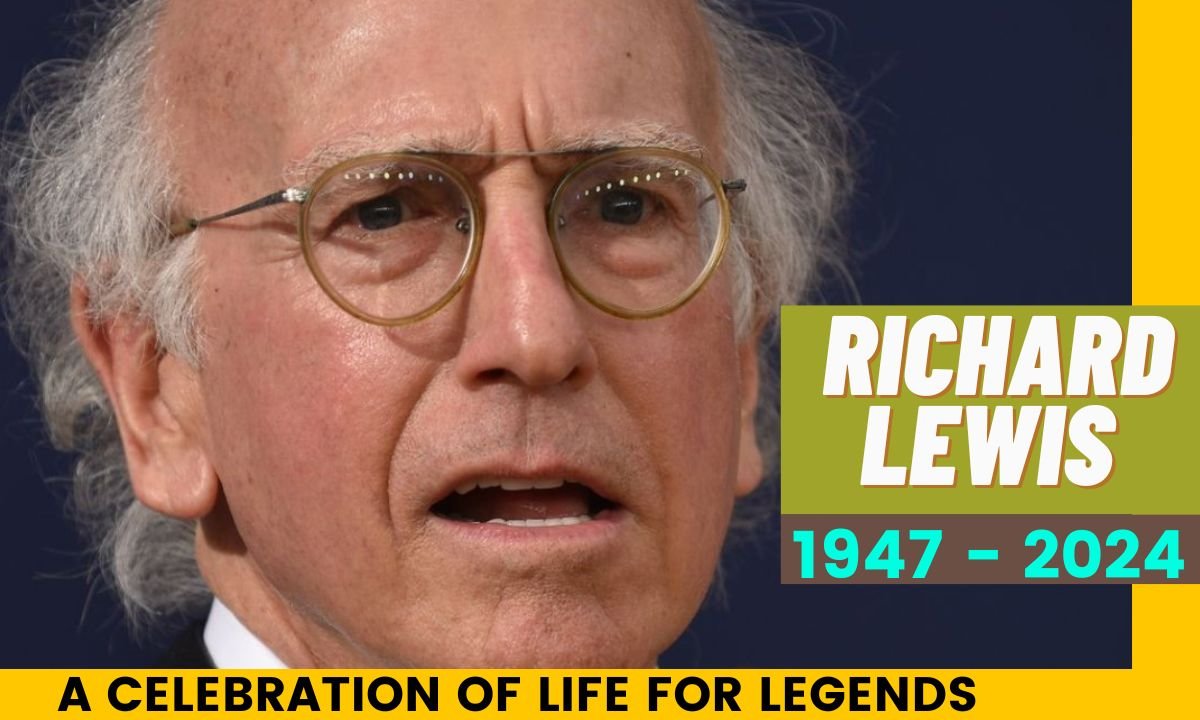
Richard Lewis leaves behind a legacy far greater than his signature self-deprecating humor and neurotic persona. He was a pivotal figure in stand-up comedy, influencing generations of comedians with his unique style and willingness to delve into personal struggles.
Lewis’s impact on stand-up comedy is undeniable. His brand of humor, characterized by honesty, vulnerability, and observational wit, paved the way for a more introspective and relatable form of stand-up. Comedians like Sarah Silverman, Marc Maron, and Larry David have all acknowledged Lewis’s influence, citing his ability to weave personal anecdotes and self-reflection into humorous narratives.
Beyond influencing the comedic landscape, Lewis also left a lasting cultural impact. His iconic catchphrases, most notably “you didn’t!” and “from hell,” became part of the pop culture lexicon, solidifying his place in the public consciousness. Additionally, his portrayal of Jewish characters in shows like “Anything But Love” helped break down stereotypes and introduced a more nuanced representation on television.
Throughout his career, Lewis received numerous accolades for his work, including an American Comedy Award for Best Male Stand-up Comic in 1990 and two Primetime Emmy Award nominations for Outstanding Supporting Actor in a Comedy Series for his role in “Curb Your Enthusiasm.”
Fellow comedians and critics expressed their admiration for Lewis’s talent and contributions to the world of comedy. Jerry Seinfeld, in a tribute to Lewis, stated, “He’s an original, a true one-of-a-kind. His comedic timing is impeccable, and he has a knack for making the most personal experiences universally relatable.”
A prominent critic, Alan Sepinwall, wrote in his review of “Curb Your Enthusiasm,” “Lewis is a comedic genius, capable of finding humor in the most mundane situations and turning his own insecurities into a source of laughter.”
Fans, too, echoed their appreciation for Lewis’s work. In online forums and social media posts, countless messages poured in, remembering him as a comedic icon who brought joy and laughter into their lives.
Richard Lewis’s legacy stretches beyond the stage and the screen. He was a comedian who dared to be vulnerable, an artist who turned his struggles into comedic gold, and a true inspiration for those who dared to laugh at themselves and the complexities of life. His impact will continue to resonate with audiences and aspiring comedians for generations to come.
